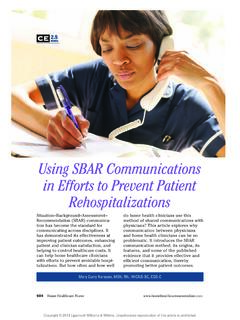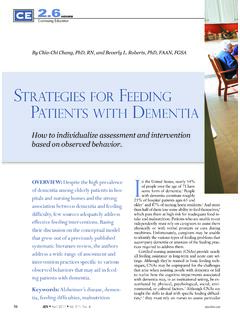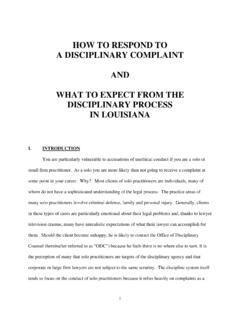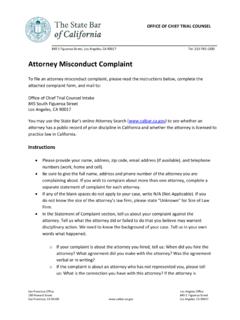Transcription of Professional Licensure: Investigation and Disciplinary Action
1 AJN November 2012 Vol. 112, No. 11 53 LEGAL CLINICBy Edie Brous, JD, MS, MPH, RNProfessional licensure : Investigation and Disciplinary ActionComprehensive information on protecting one s nursing license. complaints to nursing boards can come from a number of sources. Patients, coworkers, members of the public, or employers can call the board of nursing, put complaints in writing, or complete a board of nursing Web site complaint form . Licensees may also self-report when required by law to do so. Additionally, a board may be no-tified by other nursing boards, other agencies, or law enforcement of Action taken against a nurse. Generally, the complaint is kept confidential, as is the identity of the complainant. The information obtained in the Investigation may also be kept con-fidential, even from the subject of the receipt of a complaint, the nursing board will confirm that the nurse is licensed in that state or jurisdiction and that the complaint is governed by the laws and regulations of that state.
2 If the com-plaint lies outside the parameters of the nursing board s purview, the complainant will be notified that the matter won t be addressed by the board. The complaint may be forwarded to other agencies under whose jurisdiction the matter does fall, or the case may be closed. If the matter is found to be within the board s jurisdiction, and the complaint is such that, were the allegations true, they would con-stitute a violation of nursing rules and regulations, a formal Investigation will ensue. The nurse is noti-fied that an Investigation is being undertaken; at that time, she or he should immediately seek the advice of counsel. Failure to respond to a nursing board inquiry can result in a default judgment of Disciplinary Action , including permanent revocation of one s boards take complaints very seriously and may be required by law to investigate each complaint received.
3 Because the mission of the licensing board is to protect the public, an Investigation may be re-quired to ensure that the licensee is competent and ethical and provides safe care. Investigations are conducted in a number of manners. Some nursing boards use board-appointed investigators to conduct interviews of the licensee who is the subject of the complaint. Some boards require nurses to complete questionnaires, called interrogatories, to provide the This is the second article in a three-part series on nursing boards Disciplinary actions and what nurses need to know to maintain their license in good standing. This article discusses common reasons boards of nurs-ing conduct investigations and take Disciplinary Action . The third and final article will discuss strategies for protecting your license. Illustration by Janet AJN November 2012 Vol.
4 112, No. 11 CLINIC necessary information. Nursing boards may also con-duct informal settlement conferences or formal hear-ings to determine whether the nurse has violated laws and regulations that govern nursing practice in the state. Still other states issue an order to show cause, which is a court order requiring nurses to appear at a certain time and date and prove why the board shouldn t take Disciplinary Action . This is an adver-sarial process, and nurses shouldn t answer questions, make statements, or appear at proceedings without counsel purpose of the Investigation is fact-finding. The investigator collects data, interviews parties, re-views records, and assembles evidence related to the events and circumstances surrounding the complaint. The investigator then compiles a report that details the elements of the allegations against the nurse and the facts as determined by the Investigation .
5 Relevant evidence and documents are then forwarded to the prosecutor or nursing board designated personnel. Expert consultants may review the materials and may be used as testifying witnesses by the prosecutor. Inves-tigations will include a review of adverse employment actions, other administrative agency determinations, criminal proceedings, and out-of-state Disciplinary actions. The licensee will be notified either that the investi-gation didn t result in information suggesting that vio-lations occurred or that charges are warranted. If the nursing board finds that there isn t sufficient evidence to support adverse actions, the matter will be closed. How long nursing boards keep the investigative mate-rials and whether or not they expunge the complaint from the nurse s record varies. (State-specific informa-tion can be found on the National Council of State Boards of Nursing [NCSBN] Web site: ) If the board thinks Disciplinary ac-tion is indicated, the nurse may have one of several op-tions: a consent agreement, settlement, or stipulation; attendance at an informal settlement conference; or a formal hearing.
6 Regardless of whether they result from a consent agreement, informal settlement con-ference, or formal hearing, Disciplinary actions may then be published on the Internet, posted on the nurs-ing board s Web site, printed in the board s next news-letter, or reported to other agencies, including data banks and the NCSBN. Most Disciplinary actions be-come a permanent part of the nurse s record and are considered public agreement. A consent agreement or stip-ulation is a negotiated settlement in which the board of nursing and the nurse agree to a penalty. The nurse may or may not be required to admit wrongdoing to enter into the agreement. In states in which the licensee does have to admit wrongdoing, it will be impossible to later deny the allegations or appeal the facts of the charges once the agreement has been signed. Signing a consent agreement may also waive one s right to a later hearing or appeal.
7 Once the agreement is signed, it s submitted to the board for approval, along with all investigative mate-rials. The licensee may or may not be present when the agreement is presented. If the nurse is present when the agreement is submitted to the board, she or he may be required to take an oath and answer ques-tions board members pose. If the nurse isn t required to be present, notification will be sent as to whether or not the agreement was accepted. If the agreement is accepted, it will be followed by a formal final order accepting the terms. (A final order is a written order issued by the board that contains the findings of fact and conclusions of law in the case.) If the agreement isn t accepted, the prosecutor and the nurse will be notified and the matter may proceed to an informal settlement conference or a formal settlement conference.
8 Although less formal than an actual hearing, informal settlement conferences are still official proceedings. Because state-ments made at an informal settlement conference can be harmful to the nurse in a subsequent formal hear-ing, nurses shouldn t attend informal settlement con-ferences without an , the prosecutor will begin by offering an agreement that contains the findings from the investi-gation and the prosecutor s recommendations regard-ing the discipline for the infraction. If the nurse agrees to the proposed order, the agreement is signed by both parties and sent to the board for approval. The board may approve the proposed order as is, suggest modi-fications, or reject it entirely. If the board approves the proposed order without changes, it becomes a fi-nal order. If the board rejects the proposed order or suggests modifications, the nurse may still be able to proceed to a formal hearing.
9 If the nurse doesn t agree with the proposed order, the conference provides the nurse with an opportunity to respond to the allegations and dispute the evidence or proposed Disciplinary Action and to provide addi-tional information for the board s consideration. The committee or hearing officer will generally make a de-termination at the end of the conference. If the nurse disagrees with the recommendations, the board may require the nurse to submit proposed revisions for consideration or permit the nurse to proceed directly to a formal hearing. There may be time limits for re-questing the hearing, and the right to do so may be waived if the deadline is hearing. Formal hearings are similar to civil trials. The board of nursing must prove the alle-gations in the complaint, but the standard of proof AJN November 2012 Vol. 112, No. 11 55required to do so will differ by state.
10 Even though the standard isn t as rigorous as in a criminal prose-cution (beyond a reasonable doubt), the board may need to show by a preponderance of the evidence (more likely than not) or by clear and convincing evi-dence that the assertions are true. The hearing takes place in a courtroom-like setting in front of an ad-ministrative law judge (ALJ), hearing officer, a board of nursing member, a hearing panel consisting of sev-eral nursing board members, or the entire board of nursing, depending on the state. A court reporter records the entire proceeding and a transcript is made. The prosecutor makes statements; examines witnesses, including experts; and presents evidence. The defense may cross-examine the prose-cution s witnesses. After resting her or his case, the defense may also present evidence and the defense witnesses may be cross-examined by the prosecutor.



















